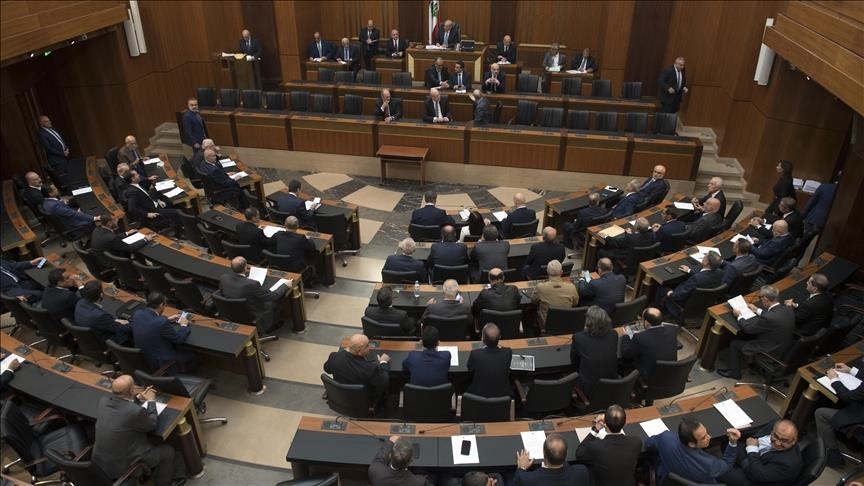Beirut / Wassim Seif El Din / Anatolia
– MEPs failed for the fifth time to elect a successor to outgoing President Michel Aoun and the presidential vacuum is expected to continue for several months
– Professor of international law Paul Morcos: many politicians use the constitution as a vehicle for obstruction and procrastination until regional and international conditions mature to give the necessary signal to elect the president
– Political analyst Ali Al-Amin: Interpretations that upset the constitution have forced the election of the president with a two-thirds majority in all electoral cycles. Consensus is a restriction on the authority of the presidency, a brake on the paths of change and fear of influence and power.
– Politician Khaldun Al-Sharif: The question is very complicated. Representatives will not elect a new president until regional consensus is reached.
The Lebanese have not yet been able to elect a new president of the republic, so much so that the vacuum continues in the first presidency between the three presidencies. Political parties have not yet agreed on the name of the country’s fourteenth president.
Since last September, parliamentarians have failed 5 times, last Thursday, in electing a successor to Michel Aoun, whose term expired at the end of last October, amid expectations that the presidential vacuum will continue for several months.
For 79 years, power did not pass from one president to another on a regular basis, and in the context of normal presidential elections, except during two out of 13 terms, and after Lebanon’s independence, a presidential vacancy 3 occurred. times.
Lebanon is currently facing an unprecedented government crisis with the absence of a president, and in light of a Najib Mikati-led interim government with limited powers and a divided parliament over many assets, so no party has the power to impose a free election president, as required by the constitution.
The Lebanese constitution provides that the parliament elects the president by secret ballot, and this parliament is made up of 128 seats equally divided between Islamic and Christian sects.
Within the consensus, the country will be led by a Maronite Christian, a Sunni prime minister and a president of the Shia parliament.
According to article 49 of the Constitution, the president of the country is elected in the first round of voting with a majority of two thirds, or 86 deputies (out of 128), and an absolute majority (half +1) is sufficient in the following sessions, to provided that the quorum for participation in these sessions, both the first and the second, is 86 alternates.
According to insiders, foreign influence could play a role in concluding deals to elect the president in a country where international competitions have always played a role in its internal crises.
** Texts and Ethics
Political analysts and legal experts unanimously agreed that the flaw is not in the constitutional texts, but in using them according to the interests of politicians who are waiting for the green light from abroad to elect the president.
Professor of international law, Dr. Paul Morcos, head of the human rights foundation JUSTICIA, expressed his indignation, “because the practice that many politicians follow in the presidential election process is below the level of clear constitutional and legal texts on the matter.”
Morcos told the Anadolu Agency that “the problem in Lebanon is related to political ethics and not to constitutional texts, although the latter need to be developed, as they are used in bad faith instead of true democratic practice”.
He felt that “many politicians in Lebanon dare to interpret the constitution however they want and, if they implement it, they apply it to serve their political interests by disrupting presidential election sessions”.
He criticized “the game of stonewalling that is inflicted on constitutional institutions, starting with the House of Representatives in terms of hindering their healing under the pretext of quorum, which they use as a hook instead of playing the game of democratic majorities, all via the Council of ministers “.
** The system of government
In agreement with Morcos, political analyst Ali Al-Amin told the Anadolu Agency that “any constitution, however clear it may be, cannot implement its provisions or achieve its goal if the intentions of those who should implement it are bad “.
He added that “the constitution in Lebanon has turned into a point of view, because its application clashes with the interests of the forces of government and control of the system”.
He believed that “disruptive interpretations of the text and spirit of the constitution required that the president be elected by a two-thirds majority of the House of Representatives in all election cycles, and this is what causes the interruption of the electoral sessions that take place after the first session “.
He believed that “the purpose of the suspicious interpretation of the constitution in this case is to strike at the idea of elections and competition between candidates, to prevent the arrival of a lenient president under conditions falsely called conditions of consent”.
** Too complicated
Regarding the democratic election of a president in Lebanon, Khaldun Sharif, politician and former adviser to Prime Minister Najib Mikati, said that “the matter is very complicated”.
He added to the Anadolu Agency: “Not because Lebanon needs a new system, but rather to know how to implement its constitution, which requires the need for dialogue between the Lebanese parties to find a consensus to manage the country”.
He stressed that “since Lebanon’s independence in 1943, the Lebanese have not been able to elect a president through democratic elections except once, and this is President Suleiman Franjieh (1970-1976) with one vote.”
** External green light
In this regard, Morcos said that “some political parties are unfortunately waiting for external signals on the election of the president, which is not a mature question”.
He continued: “Many politicians use constitutional texts as a means of moving forward in the process of obstruction and procrastination until regional and international conditions mature to give the necessary signal to elect the president.”
As for Sharif, he felt that “the practice of elections in parliament is difficult due to the acceptance by the Lebanese, especially political officials among them, since the independence that there is no purely democratic option and that the choice is linked to regional and international options “.
He continued: “Lebanese parliamentarians will not elect a new president for the country until a regional consensus is within reach at this time.”
** “Compliance” is a limitation of power
Al-Amin held that “free elections and democratic competition trigger from the position of the first presidency a democratic dynamism in the rest of the constitutional institutions and offer serious prospects for smooth and democratic change in state institutions confiscated by the power of sectarian militias and a consensus destructive state between them “.
As for consensus, he saw it as “a restriction on the authority of the presidency, an emptying of democracy, a brake on the paths of change and a collusion between the parties of the system of government with its various parties to prevent any new ones from entering the theater of power that could upset the equation or limit its influence and influence.
Parliament Speaker Nabih Berri’s attempt to conduct a broad parliamentary dialogue to reach a consensual president fell after he met with objections from the “Lebanese Forces” led by Samir Geagea and the “Free Patriotic Movement” led by representative Gebran Bassil.
And Berri has said several times that “if Parliament meets dozens of times, we will remain in the same cycle, and he will not elect a president, because political consensus is the basis for any candidate to reach the presidency”.
Firstly, Berri, the “Hezbollah” group (ally of Iran), the “Free Patriotic Movement” and the “Marada Movement” led by Suleiman Franjieh are accused of interrupting the presidential election sessions.
These people continue to vote with the White Paper, and in each session they lose their quorum, especially in the second session, and repeat the scene of their exit from the hall of parliament, until the imposition of a candidate with a political solution (consensus) .
The news published on the official page of the Anadolu Agency is the abbreviation of a part of the news that is presented to subscribers through the News Stream System (HAS). To register with the agency, please contact the following link.


